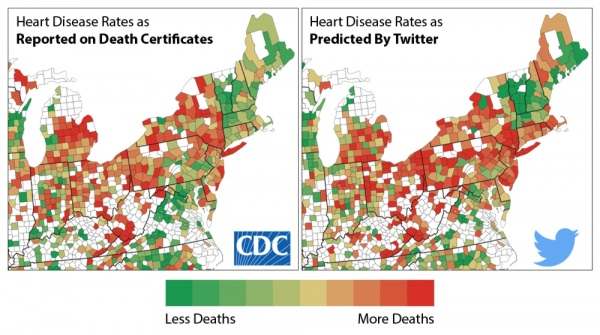| Twitter Can Identify Heart Disease |
| Written by Kay Ewbank | |||
| Wednesday, 28 January 2015 | |||
|
Researchers have shown that Twitter can serve as a dashboard indicator of a community’s psychological well-being and can predict rates of heart disease. The research was carried out at the University of Pennsylvania by a team led by graduate student Johannes Eichstaedt, and is based on the fact that Twitter can capture more information about heart disease risk than many traditional factors combined, as it also characterizes the psychological atmosphere of a community. Many factors contribute to the risk of heart disease, not just traditional ones, like low income or smoking but also psychological ones, like stress. The researchers found that when a community’s tweets showed higher levels of negative emotions such as anger, stress and fatigue, that was associated with higher heart disease risk. On the other hand, positive emotions like excitement and optimism were associated with lower risk. Until now, it’s been hard to measure the psychological well-being of a community, but using Twitter may provide a useful tool in epidemiology and for measuring the effectiveness of public-health interventions. The combination of freely available social media data and big data analysis techniques meant the team could search for correlations between the language used in tweets and underlying health. The results of the study were published with the title Psychological Language on Twitter Predicts County-Level Heart Disease Mortality in the journal Psychological Science. The researchers from the World Well-Being Project studied the degree to which the language people use online represents their inner thoughts and feelings. The team based their research on more traditional research looking at the way peoples’ inner emotional lives can be extrapolated from the words they use when speaking or writing. Having identified the correlations between language and emotional states, the researchers went on to see if they could show connections between those emotional states and physical outcomes rooted in them, choosing coronary heart disease as an ideal marker. One of team, Margaret Kern, an assistant professor at the University of Melbourne, Australia.explains: “Psychological states have long been thought to have an effect on coronary heart disease. For example, hostility and depression have been linked with heart disease at the individual level through biological effects. But negative emotions can also trigger behavioral and social responses; you are also more likely to drink, eat poorly and be isolated from other people which can indirectly lead to heart disease." Heart disease is one cause that is clearly identified as the underlying cause of death on death certificates, and public health officials also collect data about possible risk factors, such as rates of smoking, obesity, hypertension and lack of exercise. This data is available on a county-by-county level in the United States, so the research team aimed to match this physical epidemiology with their digital Twitter version.
Drawing on a set of public tweets made between 2009 and 2010, the researchers used established emotional dictionaries, as well as automatically generated clusters of words reflecting behaviors and attitudes, to analyze a random sample of tweets from individuals who had made their locations available. There were enough tweets and health data from about 1,300 counties, which contain 88 percent of the country’s population. The team found that negative emotional language and topics, such as words like “hate” or expletives, remained strongly correlated with heart disease mortality, even after variables like income and education were taken into account. Positive emotional language showed the opposite correlation, suggesting that optimism and positive experiences, words like “wonderful” or “friends,” may be protective against heart disease. Another team member, Andrew Schwartz, a visiting assistant professor in the Department of Computer and Information Science, noted: “The relationship between language and mortality is particularly surprising since the people tweeting angry words and topics are in general not the ones dying of heart disease. But that means if many of your neighbors are angry, you are more likely to die of heart disease.” This finding fits into existing sociological research that suggests that the combined characteristics of communities can be more predictive of physical health than the reports of any one individual.
More InformationTwitter Can Predict Rates of Coronary Heart Disease, According to Penn Research Related ArticlesTwitter Indexes Every Single Tweet Ever Twitter Used To Map Happiness In New York Twitter Can't Predict Elections Either Google Uses Search Data To Predict Box Office Hits Google Flu Trends Adopts New Model
To be informed about new articles on I Programmer, install the I Programmer Toolbar, subscribe to the RSS feed, follow us on, Twitter, Facebook, Google+ or Linkedin, or sign up for our weekly newsletter.
Comments
or email your comment to: comments@i-programmer.info |
|||
| Last Updated ( Wednesday, 04 February 2015 ) |




